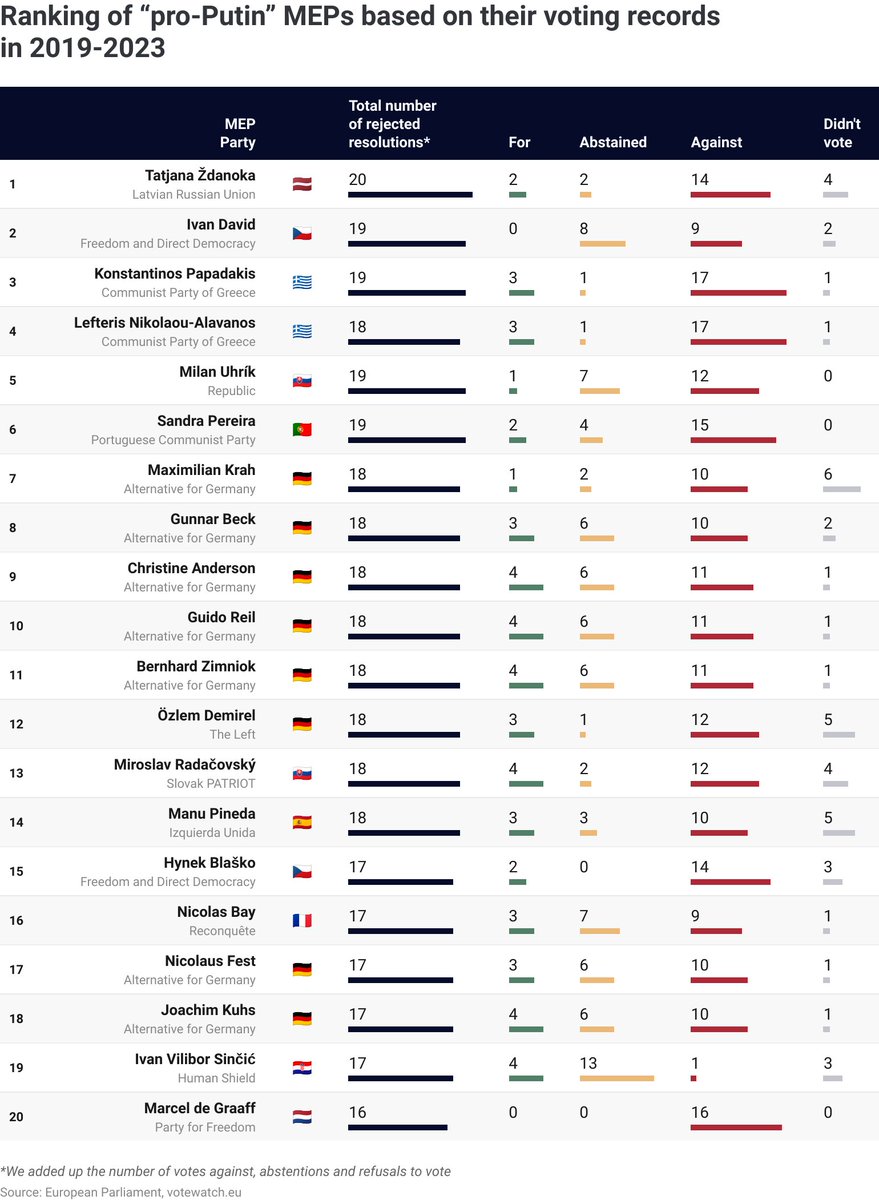In today’s Vatnik Soup REBREW, I’ll re-introduce a Latvian politician and former MEP, Tatjana Ždanoka. She’s best-known for her history in the Communist Party of Latvia, for her pro-Russian politics in the country, and her connections to Russian intelligence.
1/22
1/22

Based on Ždanoka’s speeches and social media posts, she has a deep hatred towards the people of Latvia. The reason for this can only be speculated, but part of it could be due to her paternal family being killed by the Latvian Auxiliary Police,…
2/22
2/22

…a paramilitary force supported by the Nazis, during the early 1940s. Ždanoka became politically active in the late 80s. She was one of the leaders of Interfront, a political party that supported Latvia remaining part of the USSR.
3/22
3/22

In 1999, Ždanoka was banned from the Latvian parliament and lost her seat on the Riga City Council after it was revealed she had served on the Communist Party’s Audit Committee following its 1991 call for a coup against the Latvian government.
4/22

4/22


After this, her only option to have influence through politics was the European Parliament (EP), in which she was elected for the first time in 2004 and many times since with the help of the large Russian-speaking population in Latvia.
5/22
5/22

Since Soviet times, she has staunchly supported the Kremlin. Like many Russians, she said she was “ashamed to admit” being Russian during the Yeltsin era, but now “was no longer embarrassed for Russia and its leadership” — even attending one of Putin’s “Nashi” youth camps.
6/22

6/22


In 2024, a joint investigation revealed that Ždanoka has been in contact with Russian FSB operatives since at least 2005. She passed on political intel, helped organize Kremlin-friendly events, and maintained a long-term relationship with her handlers.
7/22
7/22

Her leaked emails show she informed the FSB about EU parliamentary activities, including internal meetings, travel, and protests. She offered help with shaping Russia’s soft-power image abroad and was seen as a reliable Kremlin puppet in Brussels.
8/22
8/22

Between 2013–2017, she exchanged over 19,000 emails with her FSB handler. She passed on insider insights about Ukraine’s Maidan protests, EU sentiment, and Latvian politics. She even proposed strategies for discrediting the Baltic states on the world stage.
9/22
9/22

After the revelations, the European Parliament fined Ždanoka and banned her from hosting events or using Parliament funds. An official investigation is ongoing, but the case underscores Russia’s deep-rooted efforts to influence EU politics from within.
10/22
10/22

In 2014, Ždanoka traveled to Crimea as an “international observer” for the referendum, with the trip funded by the EU. Latvia’s Foreign Minister Edgars Rinkēvičs clarified she did not represent Latvia or the EU, as she had no official authorization.
11/22

11/22


At the same time, Ždanoka actively promoted the narrative that Russian minorities were being repressed in Donbas. She also tried to link the alleged repressors to far-right politics, reinforcing Kremlin talking points about Ukraine and its government.
12/22
12/22

Ždanoka has frequently used her platform in the European Parliament to claim repression of the Russian language in Ukraine and the Baltics. She once ridiculously compared the situation of Latvia’s Russian-speaking population to that of Jews before World War II.
13/22
13/22

In 2016, Ždanoka visited Syria and met with then-leader Bashar al-Assad. She was joined by Estonian MEP Jana Toom and Spanish MEP Javier Couso Permuy. The visit took place while Russia was already actively supporting Assad’s brutal campaign against civilians.
14/22
14/22

Over the years, Ždanoka has closely collaborated with former Irish MEPs Mick Wallace and Clare Daly. All three have publicly defended Algirdas Paleckis, a Lithuanian politician convicted in 2021 for spying on behalf of Russian intelligence.
15/22


15/22



On Feb 16, 2022, Ždanoka gave a speech in the European Parliament accusing fellow MEPs of using Nazi slogans. She repeated false claims of a “genocide in Donbas” and displayed a photo of a 4-year-old allegedly killed in shelling, parroting Kremlin bullshit.
16/22
16/22
While thousands were dying in Ukraine, Ždanoka focused on Latvia removing Soviet-era statues. In 2022, most of her EP speeches condemned the dismantling of “over 70 monuments to liberators of Latvia,” and her party gathered 10,000 signatures opposing their removal.
17/22



17/22




Ždanoka’s voting record in the European Parliament has been consistent: out of 22 key votes, she opposed 20 measures condemning Russia. This includes votes against denouncing the 2022 invasion of Ukraine and against labeling Russia a state sponsor of terrorism.
18/22


18/22



As mentioned, Ždanoka was exposed as a Russian spy. There’s no clear evidence that Daly and Wallace were spies too, but they often acted like it. This is how Russia operates: infiltrating EU institutions and steadily chipping away their credibility from within.
19/22
19/22

Fortunately, all three Putin bootlickers are now gone from the European Parliament, but new figures appear to have taken their place. While the rhetoric is softer, the messaging remains aligned with Russia’s goals, including calls for Ukraine’s capitulation.
20/22
20/22

These figures are easy to spot — they claim to be “for peace,” vote in Russia’s interests, take “friendship trips” to Moscow, host pro-Kremlin guests, and constantly undermine the EU and its leadership.
Yes, Fidias, I am talking about you:
21/22
Yes, Fidias, I am talking about you:
21/22
https://x.com/P_Kallioniemi/status/1922229005396156534
To conclude: a vocal minority in the European Parliament continues to vote in line with Russian interests & is frequently amplified by Russian & Chinese media. Ždanoka was eventually exposed as a Russian agent — and there are likely many more cases we’ll never hear about.
22/22
22/22

The 2nd edition of “Vatnik Soup — The Ultimate Guide to Russian Disinformation” is officially out!
You can order your copy here:
kleart.eu/webshop/p/vatn…
You can order your copy here:
kleart.eu/webshop/p/vatn…
• • •
Missing some Tweet in this thread? You can try to
force a refresh

































